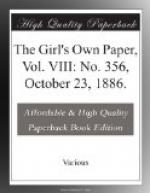TUMPY.—Our answers depend on the questions and style of the letters addressed to us. You were right in your surmise. Your writing is legible, but not sufficiently regular. If you write us a ridiculous letter we promise you a suitable answer. We are so sorry for your poor father. Could he not subscribe for Punch, or procure a few copies of the famous “Mrs. Brown” series?
HIGHLAND MARY inquires, “Who was the author of the first settler, and where is it?” How can we tell “where it is”? There have been “first settlers” in every part of the globe. The first part of your letter is better written than the concluding portion, and gives good promise for a good running hand by-and-by.
C. HORSELL.—The lines you send us are very faulty; in fact, are only badly-rhymed prose; but if it amuses you to write such, do not desist, as outlets are useful to very young people, and it seems desirable for them to give vent to their feelings a little.
NOLENS VOLENS.—Many people do not begin “My dear So-and-So,” nor end with “Yours sincerely,” etc., on a postcard, but merely write their address in full at the top, and the message signed beneath it, with initials only. But you can do as you like in the matter; there is no rule. We wonder that, having such suspicions of our honesty, you continued to read our paper.
ROUSSEAU and FLOSSY.—We know of no cure for mere nervousness, unless, as sometimes happens, it passes into a disease, when a doctor should be consulted. Try to forget yourself in the pleasure of adding to the enjoyment of others.
HOPE ATHELING.—A.E.I. means “for ever.” “I don’t think” is a common colloquialism used by everyone, and is not more incorrect than such expressions generally are.
J. S. F.—
“Not even the tenderest
heart, and next our own,
Knows half the reasons why
we smile and sigh,”
is from Keble’s “Christian Year,” 24th Sunday after Trinity, verse 1.
MARIE.—The quotation—
“A primrose by a river’s
brim
A yellow primrose was to him,
And it was nothing
more,”
is from Wordsworth’s poem, “Peter Bell,” part i.; stanza 12.




